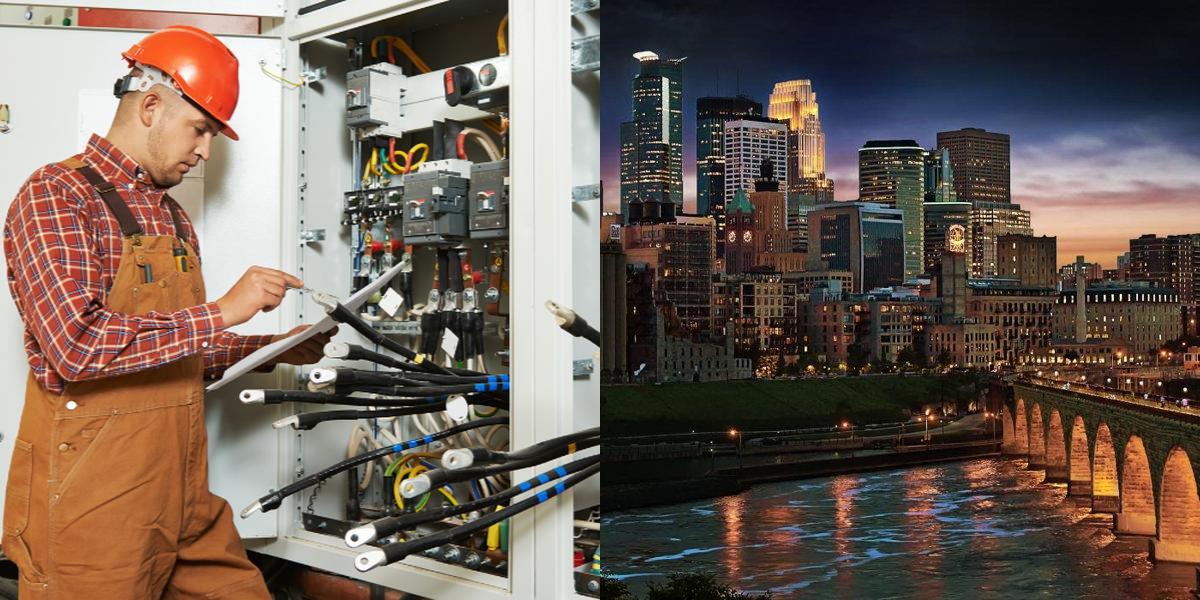How to Become an Electrician in Minnesota

Electricians play a crucial role in ensuring the safe and efficient operation of electrical systems. They are responsible for installing, repairing, and maintaining electrical wiring, fixtures, and equipment. Here is a guide on how to become an electrician in Minnesota.
Network
Networking is an important part of finding a job in any field, and the electrical industry is no exception. Reach out to family, friends, and acquaintances who may know of job opportunities or be able to connect you with potential employers.
Joining professional organizations, such as the National Electrical Contractors Association (NECA) or the International Brotherhood of Electrical Workers (IBEW), can also provide valuable networking opportunities. These organizations often have local chapters that host meetings, events, and job fairs where you can connect with other professionals in the industry.
Apply for Jobs
Once you have a strong resume and have built a network of contacts, it's time to start applying for jobs. Look for job postings online, in local newspapers, or on company websites. You can also reach out directly to electrical contractors or companies in your area to inquire about job openings.
When applying for jobs, be sure to tailor your resume and cover letter to each position. Highlight any relevant skills or experience that make you a good fit for the job. Be professional and thorough in your application materials, and follow up with employers after submitting your application to express your interest and inquire about the hiring process.
Gain Experience
If you're having trouble finding a job as an electrician, consider gaining additional experience through temporary work or volunteer opportunities. This can help you build your skills, expand your network, and make you a more attractive candidate to potential employers.
You can also consider offering your services as a freelance electrician or starting your own electrical contracting business. This can be a great way to gain experience, build your reputation, and establish yourself as a skilled electrician.
Career Paths and Opportunities after Becoming an Electrician
Once you have obtained your electrician certification and found a job as an electrician, there are many different career paths and opportunities available to you. Here are a few examples:
Residential Electrician
One common career path for electricians is to specialize in residential electrical work. Residential electricians focus on installing, repairing, and maintaining electrical systems in homes. They may work on new construction projects, remodels, or repairs and upgrades to existing electrical systems.
Residential electricians often work directly with homeowners or contractors and may be responsible for troubleshooting electrical problems, installing electrical fixtures, or upgrading electrical systems to meet current codes and regulations.
Commercial Electrician
Another career path for electricians is to specialize in commercial electrical work. Commercial electricians work on electrical systems in commercial buildings, such as office buildings, retail stores, or industrial facilities. They may be responsible for installing and maintaining electrical systems, troubleshooting electrical problems, or upgrading electrical systems to meet the needs of the business.
Commercial electricians often work as part of a team and may collaborate with other tradespeople, such as plumbers or HVAC technicians, to ensure that all systems in a building are functioning properly.
Industrial Electrician
Industrial electricians work in industrial settings, such as factories, power plants, or manufacturing facilities. They are responsible for installing, maintaining, and repairing electrical equipment and systems used in the production and operation of industrial machinery and equipment.
Industrial electricians often work with complex electrical systems, such as motor controls, programmable logic controllers (PLCs), or high-voltage power distribution systems. They may also be responsible for troubleshooting electrical problems, performing preventative maintenance, or upgrading electrical systems to improve efficiency and safety.
Electrical Contractor
Some electricians choose to start their own electrical contracting business. As an electrical contractor, you would be responsible for bidding on and managing electrical projects, hiring and supervising electricians and other employees, and ensuring that all work is completed safely and to code.
Starting your own electrical contracting business can be a rewarding career path, but it also requires strong business and management skills. You'll need to have a solid understanding of the electrical industry, be able to estimate project costs and timelines, and have the ability to effectively communicate with clients, subcontractors, and employees.
Continuing Education and Specialization
Regardless of which career path you choose, it's important to continue your education and stay up to date with the latest advancements in the electrical industry. Technology and regulations are constantly changing, and staying current can help you remain competitive and advance in your career.
There are many opportunities for continuing education and specialization in the electrical industry. You can take courses or earn certifications in areas like renewable energy systems, energy efficiency, or advanced electrical systems. These additional qualifications can help you stand out in the job market and increase your earning potential.
Final Thoughts
Becoming an electrician can be a rewarding career choice. It offers the opportunity to work with your hands, solve problems, and make a positive impact on people's lives. Whether you choose to specialize in residential, commercial, or industrial electrical work, there are many paths and opportunities available to you.
By obtaining your electrician certification, gaining experience, and staying current with industry trends, you can build a successful career as an electrician. So, if you're interested in working with electricity and have a passion for problem-solving, consider pursuing a career as an electrician.
If this article doesn't match what you're looking for, you can check out these other articles:

Blessed Joy Amarga is part of the Growth and Sales teams at Dreambound. She helps bring in new leads, increasing the number of people at the top of the sales funnel, and supporting the team in creating graphics to boost social media engagement. Blessed is also a Licensed Architect. Outside work, she enjoys traveling and exploring new places for her vlog.




